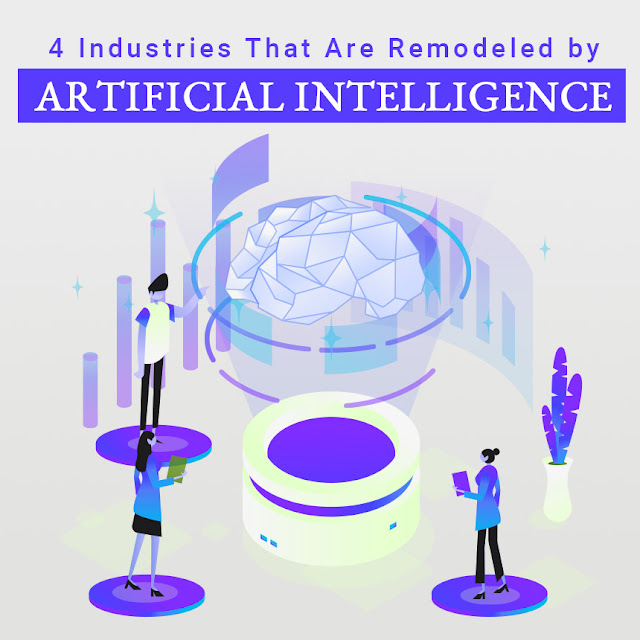4 INDUSTRIES THAT ARE REMODELED BY ARTIFICIAL INTELLIGENCE
Soon, the
world will be staring at the labor crisis that will be massive and will a
colossal burden to be handled. It is estimated that the crisis will be pretty
expensive and, overall globally, there will be a humongous demand for talented
resources in Artificial Intelligence evidently by the next decade. And not
surprisingly, the shortage of talent will affect the most developed economies.
The losses will be more than 10 percent of the current global GDP.
However, all
is not bad, because the AI technology has come a long way today. The brainchild
of Alan Turing and John McCarthy, the pioneers who laid the foundation for the
development of the technology. Presently, the technology has come out of the one-in-a-world
laboratory to thousands of labs all over the globe. It is actively remodeling
various industries by changing the way things are done that we wouldn’t have
imagined before.
Why is Artificial Intelligence misunderstood often?
AI is one of
the most misunderstood technology. Often, it is looked in comparison with
natural intelligence and somehow misinterpreted that it could eventually evade
human supervision and can dominate human beings. In addition, it is also
thought to be a deal-breaker when it comes to keeping the employment rates
healthy. However, it can’t further from the truth. According to research, it
suggests that technology will only improve the GDP rates and bring up new
employment opportunities.
With human
supervision, we can exploit the technology for the benefit of these sectors.
Let’s quickly take a look at how to do this to four top industries in
quintessential ways.
- Transportation
The
evolution of machine learning and other technologies has led to the advent of
smart transportation. Self-driving cars are something that is a lot talked
about. There are significant developmental works are being carried to perfectly
build a system of cars that can self-drive from a source to a destination
without any hiccups and efficiently without causing any accidents and traffic
violations mainly. Such methods can be applied to public transportation and
reduce significant costs and traffic congestions.
- Manufacturing
The AI-led
systems have already made inroads into manufacturing which is a good thing.
Industrial robots that can efficiently assemble and produce high-quality
products is something we’re all familiar. However, the intelligent technology can
change the manufacturing landscape by implementing smart robot to build
electronics and create objects via 3-D printing technology; objects could be as
large and essential as low-cost houses for all.
- Healthcare
Most of the
pharmaceutical and medical companies are relying on intelligent technology for
numerous uses cases already. Johnson and Johnson’s Sedasys system is something
that was developed to deliver anaesthesia to the patients for standard medical
procedures like colonoscopy. There is a huge dearth of skilled medical
professionals that can administer the right dosage of anaesthesia. IBM’s Watson
is another example that can display higher accuracies in human diagnosis.
- Customer Engagement
Today
customer engagement is wholly a new ball game. It was once fully depended on
human resources and was strictly time-bound. But with the huge AI-led approach,
customer service and engagement are more streamlined and efficient than ever. Machine
Learning capabilities of the system are proven to be extremely productive and
efficient at the same time. Now, the customers can approach for service any
time to the company and get their queries resolved. Similarly, no matter the
customer’s location, brands can keep them engaged.
Ever since
Artificial Intelligence came into the foray of the mass production, it has been
nothing but bliss to both the companies and the customers. Although there are
ups and downs, it is still part of the evolution process. And, the learning
process is necessary to build a robust system that can learn from its actions
and results and evolve to be a better performer. Tomorrow’s world is certainly
different than what we have imagined today, nevertheless more efficient and
better.


Comments
Post a Comment